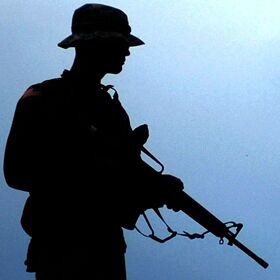
British, U.S. Militaries Dangerously Overstretched
Evidence is mounting that military overstretch is starting to leave Western combat units in Iraq dangerously vulnerable. According to a recent British Ministry of Defense document, the British Army is facing “critical weaknesses” so endemic that it is “almost impossible” for it to complete its duty in Iraq and Afghanistan (Independent, October 29).
In fact, 40 percent of Britain’s divisions report “serious or critical” problems relating to manpower shortages and are having serious problems attaining the state of “immediate readiness” for war. Units displaying critical weaknesses would find it “almost impossible” to meet pressing commitments in the field while units with serious weaknesses would find it “difficult but not impossible,” according to the Ministry of Defense (ibid.).
There are such shortages in certain key military professions that leaves of absences are being cut and extended tours are becoming commonplace. According to a recent National Audit Office report, the British military currently has a shortfall of 5,000 personnel. That may not sound like much, but when you consider that the UK only has 7,000 troops in Iraq and 5,000 in Afghanistan, it illustrates how debilitating the shortfall really is (Agence France Presse, November 3).
America too appears to be facing military overstretch. Recent warnings have come from U.S. Gen. Peter Schoomaker, who refused to submit a budget plan for 2008, arguing that the military could not continue operations in Iraq and its other missions without additional funds. General Schoomaker warned that the Iraq war has put a brutal strain on regular military budgets, which is languishing after Congress and the White House slashed several Army spending requests over the past months. General Schoomaker is regarded as an ally of the Pentagon administration, so his vocal protest underscores the seriousness of the funding shortfall (Guardian,September 26).
What’s more, as wars in Iraq and Afghanistan continue to wear on, U.S. military recruitment numbers continue to drop. In order to sustain operations, like British troops, American troops too have been held beyond their contracted terms.
“It’s quite a debacle,” says military analyst Loren Thompson, who represents the Lexington Institute think tank. “Virtually everyone in the Army feels as though their needs have been shortchanged.”
There couldn’t be a worse time for America and Britain to face crunches on their military capabilities. Trends indicate an escalation of dangers that will require robust intervention.
